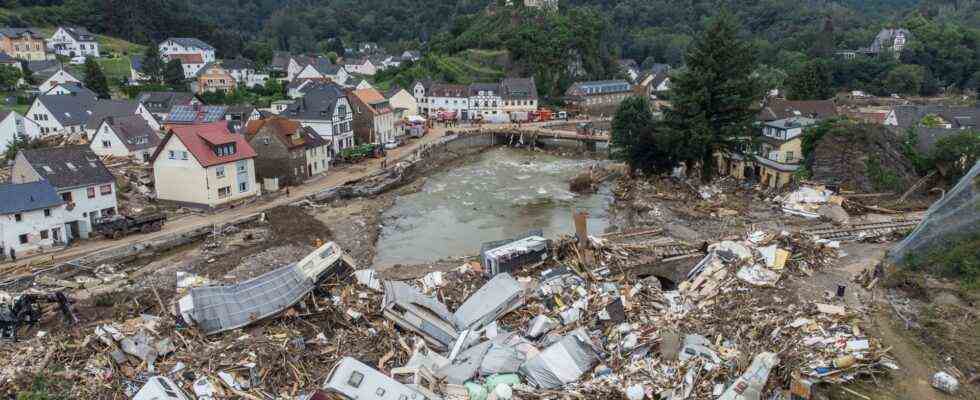Status: 07/19/2021 3:59 p.m.
In the Ahrweiler district, which was particularly hard hit by the storms, the death toll is rising. How many people are still missing is unclear. The drinking water situation is also of great concern.
After the storm disaster, the situation in the affected regions has stabilized. The clean-up work is also progressing in the particularly affected Ahrweiler district in Reinland-Palatinate. People are still missing. According to police, the number of deaths in the district rose by seven to 117.
The Interior Minister of Rhineland-Palatinate, Roger Lewentz, expects further deaths. With the drainage of the water and the emptying of the cellar, the dead would always be found, the SPD politician said SWR. “And there will be more.” Hundreds of emergency services now searched house by house and bank area by bank area as planned.
How many people would be missing is still unclear, according to the police, because the cell phone and telephone networks are still not working everywhere. In addition, not all reports could yet be compared.
“Adjusted for an extremely long position”
During a visit to Bad Neuenahr-Ahrweiler today, Federal Interior Minister Horst Seehofer got an overview of the situation. Accompanied by Federal Agriculture Minister Julia Klöckner and Lewentz, he got an impression of relief operations such as the construction of mobile drinking water systems by the Technische Hilfswerk (THW).
There has been great progress in coping with the acute disaster, said Lewentz. The helpers are in the process of reorganizing the water supply. However, the on-site deployment will probably take months. “We are prepared for an extremely long situation.”
In Rhineland-Palatinate, clean-up work and the search for missing persons are in full swing
Axel John, SWR, daily news 8:00 p.m., 7/19/2021
Seehofer: The federal government will advise on help on Wednesday
Seehofer promised uncomplicated help to those affected in Rhineland-Palatinate and North Rhine-Westphalia. “It is very important to us that you not only find the right words now, but that those words are followed by action,” he said. He estimated the cost of the reconstruction at several billion euros. “This is an exceptional situation that we can only cope with with all our efforts on site with a major national effort.”
According to Seehofer, the federal government will deal with financial aid for the flood victims on Wednesday. It is about help for people who have nothing left and about reconstruction, which will cost billions of euros. A third field is public infrastructure.
“No drinking water for weeks or even months”
The mayor of the Altenahr community, Cornelia Weigand, had previously described how tense the drinking water situation is. “It looks as if the infrastructure has been so badly destroyed that there will be no drinking water in some places for weeks or even months,” she says in the politics talk of “Bild”. It is therefore very important to be able to guarantee an emergency water supply for months if necessary. The same applies to an emergency power supply.
Weigand also made it clear that she sees the very existence of her community at risk. She cannot foresee when it will return to normal in Altenahr. “It is clear that our congregations will look different afterwards, because many of the buildings that were formative and that have stood there for 50, 100 or 150 years will have to be demolished.” She hopes there is a future for her church. “Who moves back to where a flood of the century is exceeded by a factor of 3? That cannot be calculated, it cannot be planned.”

